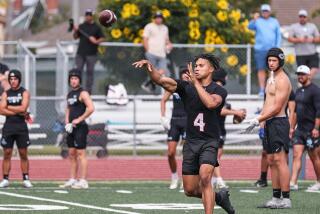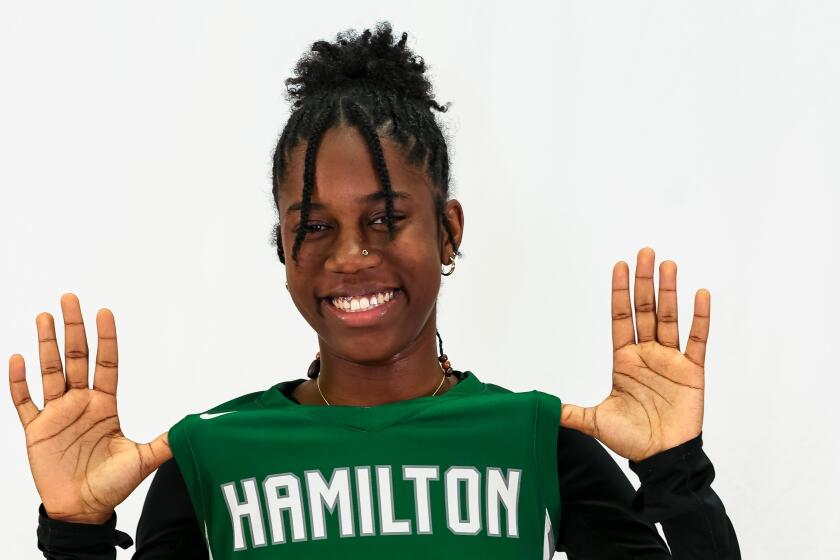JUST A GAME, STILL : Irvine’s Bob Flint Enjoying His Job, Especially After Rocky Early Seasons
In some ways, Bob Flint, Irvine High School baseball coach, never grew up.
He still enjoys pitching batting practice or swinging a fungo bat during infield drills on game day.
He loves the camaraderie among his fellow coaches in the South Coast League. His idea of an escape is watering the Vaqueros’ infield.
His coaching philosophy? He tells his players to throw strikes, play catch and put the ball in play. Nothing philosophical here.
“I’m not doing a whole lot of things different than when I was 15 years old,” he said. “I’m having a lot of fun.”
Flint, the dean of the South Coast League with seven seasons, is just a kid at heart. He might be 41 years old and the father of two, but his youth springs eternal on the baseball field. Exuberance and enthusiasm are the names of his game.
Those qualities also are evident in the classroom. Irvine Principal Gary Norton can’t say anything but outstanding things about Flint.
“He teaches with the same exuberance that he shows on the baseball field,” Norton said. “He has a remarkable way about him. He has the ability to zero in on what’s important to the kids in the classroom and on the baseball field.”
Flint teaches U.S. history in a somewhat unorthodox manner. Dan DeLeon, a long-time friend and coach at El Toro, likes to tell the story of how Flint demonstrates Southern values during the Civil War.
DeLeon: “Bob is a Southerner at heart. Every semester, he gets one of these Hulk Hogan-type T-shirts that rips apart real easy. He’ll starting extolling the virtues of how the Southerners gave the clothes off their backs during the war and, suddenly, he’ll rip off his T-shirt in front of the class.”
Flint played in the shadow of star players throughout his career. During his days at Western High in Anaheim, he was on the same pitching staff as Andy Messersmith. Messersmith led the Pioneers to the CIF Southern Section’s 4-A championship game in 1963, signed with Cal and later starred with the Angels and Dodgers.
Flint played at Fullerton and Cerritos colleges and ultimately earned a half-scholarship to Southern Methodist University. He spent his college career playing behind pitcher-quarterback Mike Livingston, who later played 11 seasons for the Kansas City Chiefs.
Flint was not drafted by a major league team, but he was invited to attend a training camp with the Chicago White Sox. At the same time, Flint was hired as a teacher and coach at Berkner High in Richardson, Tex. It was time for a career decision.
“I talked to Luke Appling, who was a scout for the White Sox at that time, and asked him about my chances of playing in the major leagues,” Flint said. “He had advised me to stay home and take the job at Berkner.”
Two years later, Flint was relieved of his coaching job because “I showed too much enthusiasm for baseball” in the football-crazy state. He returned to Western as an assistant in 1971 and became the school’s head coach two years later.
“We were average my first year and terrible my second,” Flint said. “Western has a heck of a baseball tradition, and I put some dents in the history. I had such great expectations. I left coaching and thought I’d never go back.”
Flint also left town. He packed up and moved to Pennsylvania, where he took some courses at Penn State and visited many of the historical sites he had been studying and teaching about.
“It was the Bicentennial year, which was really neat,” he said. “Basically, I needed to get away and see something different.”
But Flint returned to California in 1978 and was hired a year later at Irvine, a fledgling school that had opened in 1976. There was no sense of history or tradition there. A new, master-planned community had been carved out of orange groves, but somehow Flint felt at home.
Many of the historic sites that Flint had visited in Pennsylvania were in better condition than Irvine’s baseball program. The school had four coaches in four seasons. The team practiced on the blacktop. The Vaqueros played only six games in their first season.
“I heard horror stories of how Irvine was once beaten, 41-0,” Flint said. “There was no facility. We played 21 road games my first season. But there were no expectations. That kind of adversity is fun trying to turn around.”
And he has. The Vaqueros have qualified for the Southern Section playoffs in four of the past six seasons. They currently lead the South Coast League and are 17-7-1 overall.
Flint, with the aid of Brian Quinn, the school’s first athletic director, and assistant Barry Schulenburg, built one of the best diamonds in the county. But it wasn’t easy.
“We planted the field twice and it died,” he said. “We didn’t know that the field had been sprayed with weed killer, and every time we planted, it died.”
Flint can point to his program with pride. He’s had two players drafted--Bob Perry by the Twins in 1982 and Rod Poissant by the Tigers in 1983. His current star is first baseman Bob Hamelin, who leads the county in hitting, home runs and RBIs.
“I do a great job of coaching Bob,” Flint said. “I tell him things like, ‘Way to go’ or ‘Nice hit.’ When you have a player who can hit like him, why bother messing with him?”
Again, nothing philosophical here. Bob Flint is just having some fun.
More to Read
Get our high school sports newsletter
Prep Rally is devoted to the SoCal high school sports experience, bringing you scores, stories and a behind-the-scenes look at what makes prep sports so popular.
You may occasionally receive promotional content from the Los Angeles Times.






